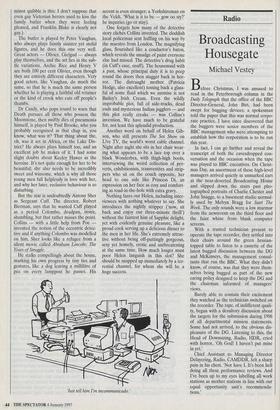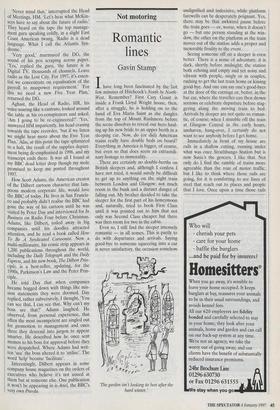Radio
Broadcasting Housegate
Michael Vestey
Before Christmas, I was amused to read in the Peterborough column in the Daily Telegraph that the office of the BBC Director-General, John Birt, had been swept for bugging devices; a spokesman told the paper that this was normal corpo- rate practice. I have since discovered that the buggers were senior members of the BBC management who were attempting to establish how the corporation is to be run this year.
In fact, I can go further and reveal the transcript of both the eavesdropped con- versation and the occasion when the tape was played to BBC executives. On Christ- mas Day, an assortment of these high-level managers arrived quietly in unmarked cars at the near-deserted Broadcasting House and slipped down the stairs past pho- tographed portraits of Charlie Chester and John Snagge, to a basement studio normal- ly used by Melvyn Bragg for Start The Week. The only sounds were a low murmur from the newsroom on the third floor and the faint whine from blank computer screens.
With a trusted technician present to operate the tape recorder, they settled into their chairs around the green hessian- topped table to listen to a cassette of the latest bugged discussion between the DG and McKinseys, the management consul- tants that run the BBC. What they didn't know, of course, was that they were them- selves being bugged as part of the new caring policy designed to keep the DG and the chairman informed of managers' views.
Barely able to contain their excitement they watched as the technician switched on the recorder. The tape, of indifferent quali- ty, began with a desultory discussion about the targets for the submission during 1996 of all departmental mission statements. Some had not arrived, to the obvious dis- pleasure of the DG. Listening to this, the Head of Downsizing, Radio, HDR, cried with horror, 'Oh God! I haven't put mine in yet.'
Chief Assistant to Managing Director Delayering, Radio, CAMDDR, felt a sharp pain in his chest. 'Nor have I. It's been hell doing all these performance reviews. And I've been up to my eyes labelling all work stations as mother stations in line with our equal opportunity unit's recommenda- tions.' `Never mind that,' interrupted the Head of Meetings, HM. 'Let's hear what McKin- seys have to say about the future of radio.' They heard on the tape the top manage- ment guru speaking coldly, in a slight East Coast American twang, 'Radio is a dead language. What I call the Atlantis Syn- drome.'
`Very good,' murmured the DG, the sound of his pen scraping across paper. `Yes,' replied the guru, 'the future is in Digital TV, thousands of channels. Leave radio as the Lost City. For 1997, it's essen- tial we concentrate on equalisation of the payroll to manpower requirement.' For this we need a new Five Year Plan,' returned the DG.
Aghast, the Head of Radio, HR, his voice soaring like a castrato, looked around the table at his co-conspirators and asked, `Am I going to be re-engineered?' Yes,' answered HM impatiently, his head craning towards the tape recorder, 'but if we listen we might hear more about the Five Year Plan.' Alas, at this point the tape spluttered to a halt, the result of the supplies depart- ment being de-emphasised in 1996, and my transcript ends there. It was all I found at my BBC dead letter drop though my mole promised to keep me posted throughout 1997.
How Scott Adams, the American creator of the Dilbert cartoon character that lam- poons modern corporate life, would love the BBC of today. He lives in San Francis- co and probably didn't realise the BBC had gone the way of his cartoon until he was visited by Peter Day and interviewed for In Business on Radio Four before Christmas. Adams, like Dilbert, toiled away in big companies until his doodles attracted attention, and he read a book called How To Be A Syndicated Cartoonist. Now a multi-millionaire, his comic strip appears in 1,200 publications throughout the world, including the Daily Telegraph and the Daily Express, and his new book, The Dilbert Prin- ciple, is a best-seller, updating, for the 1990s, Parkinson's Law and the Peter Prin- ciple.
He told Day that when companies became bogged down with things like mis- sion statements they were doomed. Day replied, rather subversively, I thought, 'You can see that, I can see that. Why can't my boss see that?' Adams laughed. He observed, from personal experience, that often the most incompetent are singled out for promotion to management and once there they descend into jargon to appear smarter. He described how he once sent memos to his boss for approval before they were despatched. Where Adams had writ- ten 'use' the boss altered it to 'utilise'. The word 'help' became 'facilitate'.
Interestingly, Dilbert appears in some company house magazines on the orders of executives who believe it's not aimed at them but at someone else. One publication it won't be appearing in is Ariel, the BBC's very own Pravda.



























































 Previous page
Previous page